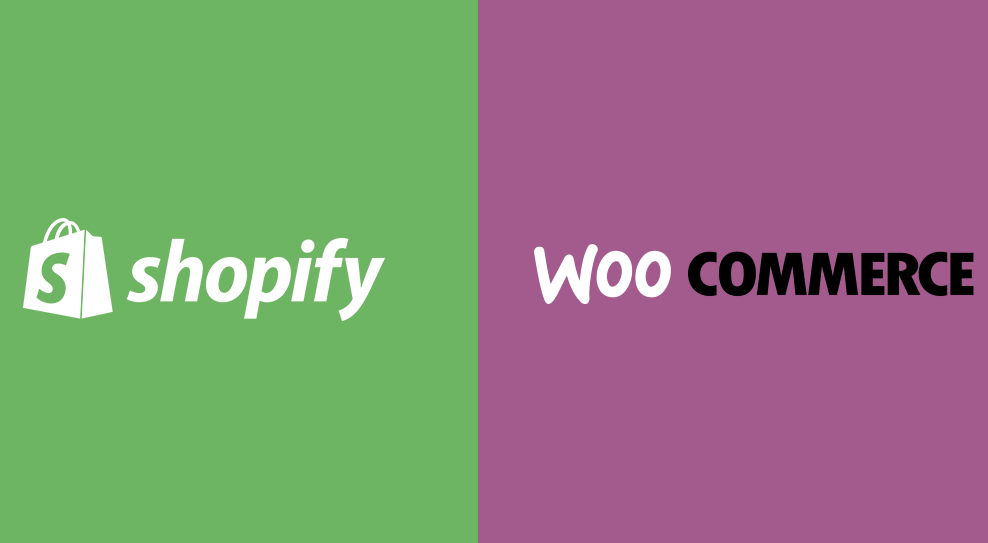The Hardest Choice: Shopify or WooCommerce? Choosing between eCommerce platforms for building a website is regarded as one of the most important decisions to start an online business.

These two platforms are regarded as the top choices in this area, and while they can be used in both small and large enterprises, each has its way of work, style, and specific advantages over the other. In this overview provided by Howtohosting Guide team, you will get acquainted with these two platforms.
WooCommerce vs Shopify Comparison: What Are They?
The Shopify eCommerce service is one of the most frequently-recommended platforms to start an online business. It powers a major part of all online retailers and is regarded as a powerful and easy-to-use solution for all products and services. It can be acquired from their developers by paying a certain sum each month.
Depending on the selected tier, different options will be available to the users. There are separate plans for high-volume and a “Lite” variant as well. Website administrators that choose to go with the Shopify option can rely on the all-in-one service, which includes the eCommerce service, hosting, support, and integrated multi-channel operations.
This means that products can be sold on Amazon, Facebook, eBay, and other popular outlets. On the other hand, WooCommerce is a plugin created for the WordPress content management system. It is an open-source extension that is free to use and install, making it a much cheaper alternative to Shopify.
All that the website administrators have to do is to deploy WordPress and then add in the free plugin. As it is a freely-available and open-source plugin, there is an enormous opportunity to customize it in any way that suits the intended online shops.
As part of a larger ecosystem that is the WordPress CMS, the WooCommerce “way” also gives online administrators the ability to purchase other add-ons that extend the capabilities at attractive prices. This is also a notable point in the presentation of this comparison.
Go With Shopify For a Smooth Setup
No doubt, Shopify is the elegant and easy-to-use option that is considered by many to be their first choice. The service provides an easy 14-day free trial, allowing anyone to start exploring the platform without committing to payment.
This is regarded as an essential selling point. Customers can explore the step-by-step tutorials and plan-up their e-commerce site. Practically all stores can be designed with custom themes and functionalities. Building sites using it is intuitive and can be mastered quickly.
All plans come with 24/7 support in case a technical issue arises. As this platform is generally a well-received and developed product, the pages created with it are going to be optimized for the best search engine results.
In comparison with WooCommerce, this service has an advantage when it comes to the overall ease-of-use management.
WooCommerce For Creating Efficient Online Stores
WooCommerce presents the best possible store creation option, providing practically all possible customizations. It is preferred by experienced and large online establishments. Many hosting services provide specialized packages allowing them to set up their installation easy.
In other cases, they will have to choose an appropriate hosting package, platform and fulfill all requirements to prepare for deployment. Our comparison and analysis show that this is not difficult even for inexperienced prospective users. It is notable for being an extensive platform of its own.
There are multiple packages, extensions, custom themes, and design elements that can be implemented to create the intended end-product. Working with the platform requires some WordPress experience and management in comparison to managed services, where users are expected to acquire some technical knowledge.
In our comparison, one of the significant differences between the two is that the first option automatically integrates with most multi-channel selling platforms such as Amazon, eBay, and Instagram. This package offers only Facebook for free. However, there are no monthly pricing requirements, as the main plugin is free.
On the other hand, this platform can be extended to include even more functions than its competitors, based on their own requirements. While making a comparison between the two platforms, in most cases, this comes up as the most cost-effective solution.
It is regarded as the better of the two in the long-term by having the ability to implement unrestricted customization of every part of the running system.
Various tools can be used to extend existing shops, depending on the exact requirements. This comparison shows that this package is one of the best examples of a developed ecosystem of assets.
Conclusion
The comparison between the two services shows that while Shopify allows for a more elegant and easier approach when building online stores, the vast customization options of WooCommerce should not be ignored as well.
While both provide an efficient plugins-based ecosystem of themes, extensions, and other addon code types, they are tailored to different types of users.
Shopify customers expect to have a fully-working platform to create and manage their online eCommerce stores, with provided support packages from the company.
On the other hand, WooCommerce users that have more knowledge of WordPress and other underlying technologies are free to customize every aspect of the installation.

